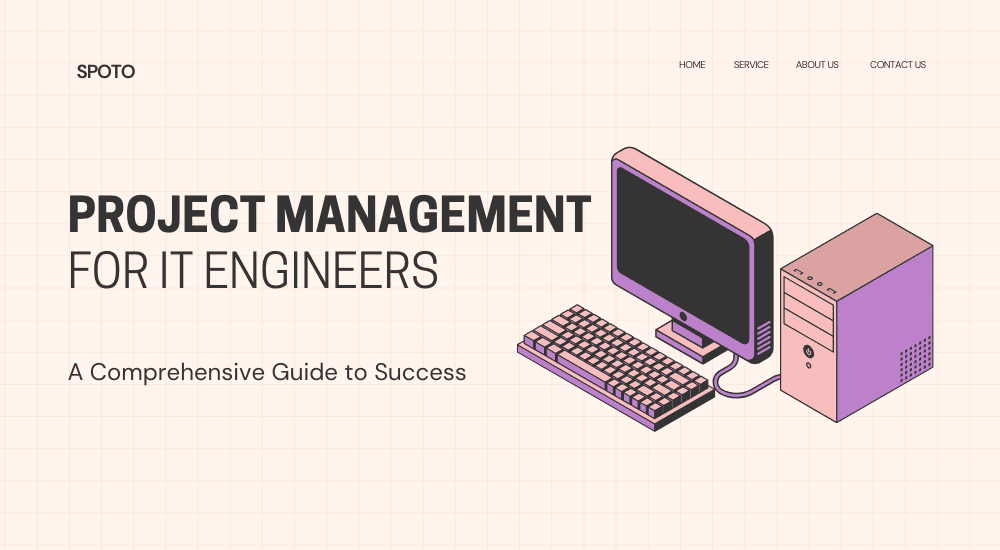Project Management for IT Engineers: A Comprehensive Guide to Success

Table of Contents
Project management is a critical aspect for IT engineers to ensure the successful delivery of projects. This article delves into the key concepts and elements of project management specific to IT professionals.
Importance of Project Management
Project management plays a vital role in guaranteeing effective project execution and reducing risks to enhance outcomes.
Phases and Methodologies
The project management process involves various phases and methodologies, including Project Initiation, Planning and Scheduling, Execution and Monitoring, Issue Resolution and Change Management, and Project Closure.
Project Manager's Role and Skills
Project managers are tasked with responsibilities such as leadership, communication, risk management, decision-making, team building, motivation, problem-solving, and adaptability.
Project Management Tools and Technology
Utilizing project management tools like Gantt charts, task management, collaboration tools, cloud-based project management software, and project visualization tools can enhance project efficiency and team collaboration.
Tips for Successful Project Management
Key tips for successful project management include understanding stakeholder expectations, managing risks, monitoring project progress, communicating and collaborating effectively with the team, and conducting thorough reviews and improvements.
Benefits of Employing Project Management Tools
- Enhanced project visibility
- Improved team collaboration
- Reduced errors and increased efficiency
Recommended Project Management Tools
- Notion
- Asana
- Backlog
- Trello
- Redmine
- Stock
- Jooto
- Linear
- Wrike
- Lychee Redmine
- Jira Software
- monday.com
Future of Project Management
The future of project management in IT engineering is evolving with digitalization, AI integration, agile project management practices, and global team collaboration becoming integral components to drive success and growth.
Conclusion
In conclusion, project management is integral for IT engineers to navigate the complexity of projects efficiently. Leveraging advanced technology and staying ahead of future trends will be crucial for continued success in the IT engineering domain.
html Project Management ArticleTips for Successful Project Management
Successful project management is crucial for achieving project goals and ensuring smooth project execution. By following key tips and strategies, project managers can enhance efficiency and drive project success.
1. Understand Stakeholder Expectations
Understanding stakeholder expectations is essential for aligning project deliverables with key objectives. By engaging with stakeholders early on and throughout the project, project managers can ensure all requirements are met and expectations are managed effectively.
2. Manage Risks and Develop Contingency Plans
Identifying and managing risks is vital in mitigating potential project disruptions. Project managers should proactively assess risks, create contingency plans, and regularly monitor and update risk assessments throughout the project lifecycle.
3. Monitor Project Progress and Performance
Regular monitoring of project progress and performance allows project managers to track milestones, timelines, and resource utilization. By implementing project tracking tools and performance metrics, managers can make informed decisions and address issues promptly.
4. Communicate and Collaborate with the Team
Effective communication and collaboration are key to fostering a cohesive and productive project team. Project managers should ensure clear and open communication channels, encourage team collaboration, and address any conflicts or misunderstandings promptly.
5. Conduct Thorough Reviews and Improvements
Regular project reviews provide valuable insights for identifying strengths, weaknesses, and areas for improvement. By conducting post-project evaluations, project managers can gather feedback, analyze outcomes, and implement lessons learned to enhance future project success.
Following these key tips for successful project management can help project managers navigate challenges, drive project efficiency, and achieve desired project outcomes.
-
What are the essential skills required for project management success in IT engineering?
Answer: Effective communication, technical knowledge, leadership skills, and problem-solving abilities are crucial for success in IT project management. -
How can IT engineers streamline project delivery processes?
Answer: By utilizing project management tools, establishing clear timelines, and fostering collaboration among team members, project delivery processes can be optimized. -
What role does risk management play in IT project management?
Answer: Risk management is vital in identifying potential obstacles and developing mitigation strategies to ensure project success. -
Why is stakeholder engagement important in IT project management?
Answer: Engaging stakeholders helps in aligning project goals, managing expectations, and ensuring project requirements are met satisfactorily. -
How does IT project management contribute to the overall success of an organization?
Answer: IT project management ensures efficient use of resources, timely delivery of projects, and alignment with business objectives, leading to overall organizational success. -
What are the common challenges faced by IT engineers in project management?
Answer: Challenges can include scope creep, inadequate resources, lack of clear communication, and changing project requirements. -
How can IT engineers enhance their project management skills?
Answer: Continuous learning, certification courses, attending workshops, and seeking mentorship are effective ways to improve project management skills. -
What is the importance of project documentation in IT project management?
Answer: Project documentation serves as a reference point, facilitates knowledge transfer, and ensures accountability throughout the project lifecycle. -
How can IT engineers ensure project quality in project management?
Answer: By defining quality metrics, conducting regular assessments, seeking feedback, and adhering to industry best practices, project quality can be assured. -
What are the benefits of adopting agile methodologies in IT project management?
Answer: Agile methodologies promote adaptability, transparency, and collaboration, leading to quicker project delivery and higher customer satisfaction.